|

Tufts of snow from a January squall
(*photo
credit
January
1, 2010 Start the Year Anew
Welcome
to our many new viewers this year! We strive to keep you coming by
thanking God for your presence and furnishing material for your
consideration. Our gratitude extends to the continued health and
resources it takes to compile, edit, install and furnish these daily
reflections with interesting and refreshing photos and special
issues. Thanks must always be the atmosphere in which we move and
breathe.
The
word "ecology" comes from ecos or home. Thus we regard the
comfortable and higher quality home to be the basic template of our
Earth healing work. This is the reason that subjects vary and have
now run into the thousands since 2004. However, beyond traditional
ecological subjects we like to broaden the field with culinary arts,
home improvement, yard management, gardening, wilderness management,
personal wellness programs, communication arts as related to healing
Earth, resource and personal planning, eco-spiritual subjects,
models and public interest groups to imitate, homilies for special
feasts, and peace and broader-based social justice issues. None are
done perfectly, but then we are not perfect healers, only sincere
ones. What begins to emerge after these "daily reflections" is that
we must always strive to broaden, not narrow the environmental
scope.
Of all
the insights that have emerged during the past year, the biggest is
that the Internet is the easiest and lowest-cost way to spread the
Word. Websites require no studios, offices or printing shops, and
the turnover from assembling to delivering information is rapid.
Provided the Internet is not saddled with governmental restrictions
or privileged privatization of the system, this medium offers a
democratic means where the poor can voice their views. In essence,
the Internet becomes a means of liberation quite similar to our free
highway system (although a number of these are being privatized).
The Internet is a technological opportunity much like ancient Rome's
road network at the time of the rise and rapid spread of early
Christianity. Using this medium well requires vigilance and
constant care, lest it be misused or coopted.
In 2010
we intend to treat some deeper subjects on a monthly sub-topical
basis -- not a day-by-day or a yearly exhaustive accounting. Some
fault this method, but for busy people this may prove more
acceptable, since we ought to hear a subject and let it sink in over
a reasonable but not oppressive length of time. The following
subjects may be considered this year on such a basis: the commons we
all share (12 different aspects), global resource use and
sustainability practices, especially with respect to future
generations, and special gifts to be thankful for during a
particular month.
Prayer: Lord, allow
us to see beyond the present moment and assist others in better ways
to reflect on the goodness of your creation, and in so doing to heal
our wounded Earth.

A glimpse into a barnyard mouse nest (snake skins and
all).
(*photo
credit)
January
2, 2010 Plan Ahead
Some of
us are compulsive planners. Maybe it is the demand to establish
order in our lives in a troubled and somewhat disordered world. But
planning may be demanded for other reasons. Some of us were slow
learners, and thus to succeed in achieving pressing assignments and
overcoming learning hurdles we had to plan so we could have
sufficient time to complete the work. I know people who learned
fast and never ever even considered planning time. School was a
breeze for them, and so they never learned planning which later life
would require -- and they were handicapped.
Why
plan ahead when we don't know what the future will bring? That
is a hard one but let's attempt an answer. God is the author of our
mortal span. Being good stewards means seeing time as a gift, and a
limited and a relatively short one at that. We must take our
responsibility seriously. The best way we compensate for past
wasted time is to use efficiently and wisely the little remaining
time. As we age and see time getting ever shorter, it is all the
more reason to plan thoughtfully.
Can't we overplan for particular occasions?
Certainly, but fewer overplan than underplan. The Lord speaks about
those who underplan, and the army is lost in battle or the house
built on sand is destroyed through lack of proper siting. Somewhere
between the rare overplanning and the far more frequent
underplanning is the happy medium to which we ought to strive. That
is why "tithing" time approaches godliness. If we give time to
planning, we show gratitude for the gift we have, for God mercifully
gives us time, so let's make the best of it.
What
do I plan for? Just
about everything: the amount of time to allot to various projects;
the amount of money apportioned to specific activities, which books
to read or periodicals to order, the month and place of vacation,
what to write and reflect about, whom to make special contact with
this year, which and how many trees to plant, what the garden design
will look like, and even how much time to give to planning itself.
We need to see that frequent small increments of planning are as
important as longer term planning -- and so continual readjustments
are necessary. Don't start with "what will I do today? "
Hopefully, that is part of a monthly or yearly plan.
Should we let others in on our planning process?
This depends. Divide planning into that which is social (working
together in cooperation with others) and that which is related to
your own personal life. Maybe the best personal planning is just
before falling asleep or just after waking up. Some will use scrap
paper and pen, other a computer or electronic gadget to help plan.
Planning time may be an unexpected wait, physical exercise time or
while going to or from work. Plan for unexpected planning time.
Prayer: Lord, teach
us to respect the gift of time You have given us, and to use it as
wisely as we can.
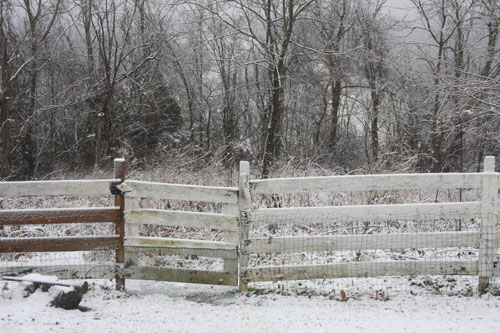
A quiet winter scene
(*photo
credit)
January
3, 2010
Epiphany: Question the Path to Take to Peace
War
would end if the dead could return.
Prime Minister Stanley Balwin*
The
wise men from the East questioned where the Christ child was
located, for they came to bring peace offerings. We too are
searching for the Prince of Peace, and we too ask where to find the
Lord, the Prince of Peace. We have simple gift and open hearts.
But like the wise men, we too must be discerning and listen to the
Spirit giving us new directions when needed so that peace will not
be destroyed. The directions we seek are simple ones: Why are we
at war?
Does a
national threat spring from the two countries that are receiving our
greatest attention -- Iraq and Afghanistan? Certainly, terrorists
from Iraq were not the same as those who bombed the Twin Towers.
Are our enemies from Afghanistan or is al Qaeda actually
centered elsewhere, in Pakistan? Are we being pushed by a
combination of military weapons industries and some right wingers in
the media and legislative halls? Most likely yes, but neither is a
sufficient reason to continue or escalate the fighting. Is there a
materials security issue here? Iraq has one of the largest reserves
of oil in the world, and so it is tempting to consider into whose
hands that precious commodity will fall. In contrast, Afghanistan
has something that threatens our security, poppies and the resulting
heroin and opium.
As
individuals and as a nation we are seeking answers this year. Maybe
our questions must be of a more searching nature. Does the very
economy in which we are engaged demand military activity in which
our own personnel are merely pawns and knights? Is our economy in
which military weaponry is a major component destabilizing the
world? Could we find a better way to peace through attempting to
secure the essential needs of people in every land? Do we not have
the backbone to get out of Iraq and Afghanistan? Are we a people
who believe we are the police force of the world, and not yet
realizing that the game is breaking us financially and morally?
Do we
seek the help of the ultimate Peacemaker and really strive for peace
now? Do we listen to the Spirit telling us of the futility of
military means and the greed of our material consumption culture?
Or do we listen to the Herods of our age? Isn't it wise to continue
the questioning throughout all of 2010? We need some answer in time
of war.
Prayer: Holy
Spirit, show us the way to peace and help us have the courage to
pursue new paths to bring this about.
*Reference:
Mike Ferner " Veterans' Group to Members: Multiply Resistance by Any
Peaceful Means Available," POCLAD, Nov, 5, 2009; Address: 1302
Waugh Dr., Suite #438, Houston, Texas 77019.
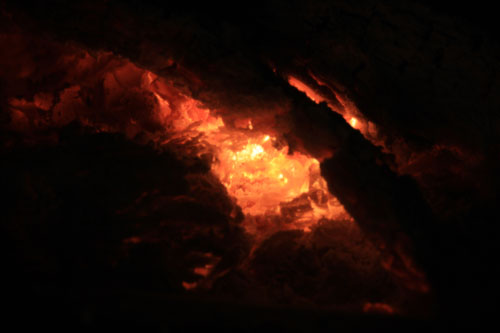
The magic of hot, glowing embers in a fireplace
(*photo
credit)
January
4, 2010 Realize that Prescription Drugs Can Kill
A
deeper spirituality for Earth healers involves recognizing current
situations, taking responsibility for the tasks ahead, and being
willing to tackle issues head on no matter how unpleasant they may
be. We in Appalachia are deeply immersed in the sin of omission, of
failing to talk about what is really killing our people, especially
many of our young folks. We are simply not doing much about the
drug overdosing occurring all around us.
A while
back I rode with the undertaker to a cemetery while accompanying the
body of a person for whom we had just had a funeral liturgy. The
undertaker confided that this was the only one of seven funerals
that week that was not due to drug overdose. Really? Small county,
massive overdosing, little formal reporting. In the autumn the
federal prison assistant who conducted me through my annual drug
testing procedure required for government contractors confided that
her stepson had just died from a drug overdose -- and the coroner of
Owsley County (population 4,500) said it was the 38th in 2009 -- and
there were still two months left. The stats in that over-drugged
county were revealing more deaths from overdoses in 2009 than would
be expected from average American death rates from all causes.
Our
part of Central Appalachia has been dependent on tobacco and tobacco
is considered to be a gateway to greater drug abuse. We need to
acknowledge the drug problem in all its causes, to get our country
to limit prescription drugs (a major culprit) to those in proven
need, to guard against abuse by people going out of state to get
drugs from loosely regulated states, to stop pill pushers, and to
address the lack of jobs for a young generation with little future.
The problem cannot be solved by tackling one single problem; we
need a holistic approach.
One of
the terrible costs of our materialistic American culture is that
individuals want more and more of what some regard as "good
things." A "freedom" to obtain more medicines penetrates the entire
society. This is the only developed land with televised drug
advertising. Don't forget, it is the drug taking that is being
pushed: "Give my child some medicine, doctor;" "Give me a
prescription to get the purple pill." An entire culture is becoming
addicted, all for massive drug company profits. Pain medicine is
now so sought by addicts that local people here keep secret that
they have had an operation or treatment, for fear that hooked
neighbors will attempt to rob them.
Invitation: If we
have the proper resources in 2010 we will work on this issue. We
invite other Appalachian groups to take up this issue in a serious
way. We need to go beyond individuals saying "No" to drugs; we
must work with all America to cut the supply of prescription AND
illegal drugs that are getting into the hands of the wrong people.
Help us to work together!
Prayer: Lord, show
us how to tackle the drug problems here.

A rustic settling, Anderson Co., KY
(*photo
credit)
January
5, 2010 Resist the Expansion of Nuclear Power
An
energy bill moving through Congress is being made hollow by the
compromise proposals to include loans for the construction of a new
generation of nuclear power plants. These of all things could mean
that the legislation would not have solid support from
environmentalists and fiscal conservatives.
Environmentally,
nuclear energy is a mirage when it comes to reported carbon
footprint reduction. Actually, new nuclear facilities and equipment
(even fuel processing) take extensive amounts of resources (steel,
concrete, and carbonaceous fuels in production) to prepare materials
and transport them to the site. Nuclear is not carbon free and all
technical people know it.
Besides, other environmental problems exist for this supposedly
"clean" electricity source. From a security standpoint, the nuclear
plant is a possible target for terrorism; the enrichment process is
a constant temptation to aspiring atomic bomb proliferators; the
process of mining uranium has health and safety dangers; and the
spent fuel remains a containment problem for centuries into the
future. And there is also the environmental/fiscal connection.
Fiscally, there is
much to consider. The nuclear industry dreams of building one
hundred new plants in America alone by 2030. A report was released
by EnvironmentAmerica on November 15, 2009, Generating Failure:
How Building Nuclear Power Plants Would Set America Back in the Race
Against Global Warming. This report states that the building of
the one hundred power plants would require an up-front investment of
$600 billion -- money, which if expended on renewable energy
sources, could cut at least twice as much carbon pollution by 2030.
The report noted that energy efficiency programs are already
reducing electricity consumption by one to two percent annually in
leading states of the Union, and the nation's wind industry is now
building wind farms equivalent to three nuclear reactors per year
with existing funds. That does not count expanded construction of
solar, geothermal and proper biofuel-fueled plants.
Do we
need these expensive six billion dollar power plants that will be
subject to cost overruns, insurance guarantees in case of accident,
and the unsure disposal of expensive waste materials? With limited
energy dollars, let's be reasonable and fiscally conservation.
Let's concentrate limited financial resources into renewable sources
and energy efficiency programs. Let's refrain from kowtowing to
industrial energy dinosaurs and political special interests. A bill
containing nuclear loans is essentially a ticket to federal
bankruptcy, and all legislators ought to be told and educated
accordingly. This nation deserves at least that much.
Prayer: Lord, teach
us to avoid being wasteful in the use of all our natural and
financial resources. Make us realistic about the true needs of
people acting sustainably.
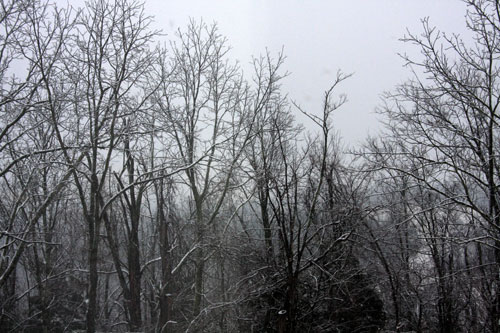
Silent Kentucky woods in winter
(*photo
credit)
January
6, 2010 Winter Riders
Cars
passed them by on the Daniel Boone,
avoiding risks perhaps but leaving them cold and stiff --
A
lift-needing twosome with a third in womb.
A
flash from thumbing days sent me brakeward.
I'll
just pick them up if nobody's on my tail
for
it's not my luck playing chicken with a coal truck.
A
word of gratitude from these young Perry Countians
coming back home. He, ex-serviceman; she, ex-waitress;
autumn sun-belt bound, winter broke and no work found.
I
offered them fruit -- looked hungry but ate little,
talk
less; why break their thought-laced faded dreams,
or
maybe of kin with whom they'd soon be home again.
Their silent but powerful presence made me wonder --
there's able-bodied Joe, a stat in the labor pool of
federal crafting, remembered only for taxes and drafting.
There's another pregnant Mary deep in mothering thoughts
or
just embarrassed to be on the road. Already
too
many fears and tears to enjoy her late teen years.
Their lives like all of ours are short, precious,
filled with unachieved goals, frustrations,
with
no pay coming for standing idle on a working day.
What
about their new one whose birth upon this Earth
ought to be a time of joy? Will there be a tomorrow
with
good springing from folks with threatened humanhood.
The
Hazard turn-off came up short.
I
let them out. They said, "Thanks!" I, "good luck!"
to
soothe their need while basking in an imperfect deed.
As I
hit the gas it struck how hitchhikers move me to
see
that mine is but an inn-on-wheels, which turned them out
to
fight the meanness of the early winter night.
Misplaced shame? Maybe. I'm not the Earth's innkeeper ---
though we might be. I've no keys to give such seekers rest
or
jobs -- but we do. Within holds a revolutionary clue.
How
can we have much and others little? We open doors
to
let them pass to find a livelihood in distant places
and
then sneak back, victims of economic slack.
We
offer a season's cheer, a bite to eat, a ride, a feeling
of
being satisfied. For these riders and their unborn we need
to
try yet untried: to give them back their human pride.
AF (Christmas, 1984-85)
Prayer: Lord, though I composed this for the Christmas season
of exactly a quarter of a century ago, I feel it still has an
element of truth today. Teach us to be constant in hope..
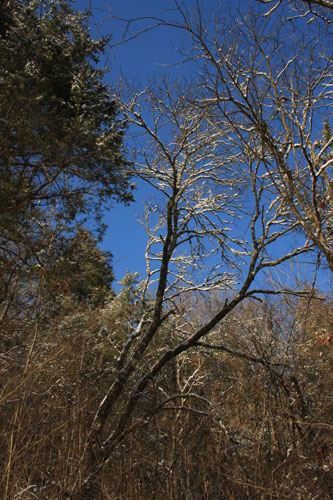
Blue January skies
(*photo
credit)
January
7, 2010 Critique the Federal Energy Star Program
Since
1995 the U.S. Environmental Protection Agency has supported an
"Energy Star Program" for the construction of energy efficient
houses. On November 10, 2009, the one millionth Energy Star
qualified home was so designated. Certainly that is a noteworthy
achievement, for every home built in this fashion involves a saving
when contrasted with a structure of similar size built with
non-energy saving materials and techniques. In fact, some 6,500
builders in every state of the Union have built structures that are
so designated by this program. Gold stars bloom. The US EPA says
that this program has been successful enough to have saved to date
some $1.2 billion (over a quarter of a billion dollars in 2009
alone). The program helped reduce some 22 billion pounds of
greenhouse gas emissions (equivalent to the emissions from 370,000
vehicles). So far so good!
However, like the rest of our consumption-based economy, there is
another side to this building program. Gradually over time more and
more people want larger homes, and the added space is expensive
terms of both building materials and the energy it takes to heat and
cool these expanded structures. If some get a star for building an
energy efficient large home for two or three persons, is that really
a saving if they are moving from a previous smaller one? Granted, a
comparable-sized house is more resource costly if green methods are
omitted; however a new "green" more spacious structure is really
more resource intensive. No one gets stars for down-sizing to
smaller homes even less efficient ones, but larger more
resource-intensive structures could get stars for using this or that
conservation measure. Stars need to be distributed for down-sizing
housing. This is the real 2010 sustainability issue.
Once I
brought this up at a meeting that was discussing green ideas, and
the room of architects/builders would not even so much as talk to
me, for I mentioned less space for all Americans in every aspect:
lodging, work, study and worship in less space.
The
difference in mentality between gold stars and not speaking to
anyone who questions the practice is exactly why the world in which
we exist is in crisis mode. We all conserve when a certain base
line of extravagance is used as the measure -- but the measuring
point and many of the measurements involve degrees of unsustainable
activity. If someone is said to conserve by a wasteful society's
standard, is this not our cultural "fiction"?
A true
energy star program involves space, well planned and well designed
comfortable space for the following reasons: less cost, less
mortgage, less cleaning, less maintenance, less furnishing of rugs,
less wasted space, less heating in winter, less fire and property
insurance, less cooling in summer, closer connection to others, more
things within easy reach. Of course the reduction in guest
accommodation could be compensated for by camping, commercial
lodging or making space in unused rooms.
Prayer: Lord, teach
us honesty in conserving resources.

Kentucky hayfied in winter
(*photo
credit)
January
8, 2010 Distinguish between
Needs and Wants
We will speak much of sustainability of our way of life, our
economic and political systems and Earth herself. We know
there is a connection between the way we act and use resources and
what can be available to all to sustain themselves. Here
communal and elementary needs clash with individual wants.
People want freedom and need freedom; people want a good life and
really need one to live as dignified inhabitants. People want
to be spiritually satisfied and need to be because of the human
person. People may want more material things (cars, boats and
more spacious dwellings) and even take them from the common pool;
people do not need these, and the acquisition may run counter to
others who need the resources to meet life's essentials of food or
shelter.
We need to -- but do not always want to -- share, but by doing so we
can fulfill our basic human longing for spiritual growth.
However, this longing can be submerged by material wants; an
inordinate impulse to fulfill the never-satisfied materialistic
allurements all about us. A materialist finds the quest for
spiritual fulfillment of little importance, since it does not
satisfy his or her individual material wants. Why share goods
with others?. However, the one who grows in spiritual ways
will say, "I want what we all want, namely, the needy to be
satisfied." Want has now been transformed to a spiritual and
communal dimension. I want to share with others.
In a material way,
we are aware that material goods cannot totally satisfy; the want
for more and more is always present. Those with some goods who
lack a sense of sharing will be all the more inclined to take as
much as possible, since in doing so they may somehow be satisfied.
However, when this proves a false goal, the materialist is moved to
strive all the harder to take, grasp on to and influence the
structures of society to legitimize takings. Here is where the
materialism of individualistic capitalism and certain forms of
collectivism share a misguided company; in both cases the
materialism is devastating to our fragile Earth.
In a spiritual way, certain collective "needs" include the needs
of the world around us. A world where all basic needs are
addressed is a safer world, a world less dependent on military
security. In
the same manner the "wants," which are considered in a pejorative
manner when regarded as selfish interests, are transformed to mean
the spiritual "wants" of those desiring to advance with others in
community. This spiritual advancement requires self-abnegation
so that we can acquire a public interest, the wanting of all to live
in harmony. Where revolution enters the picture is that the
spiritually inclined must frustrate the workings of materialists who
could destroy our Earth. Thus necessary action means
correcting a dysfunctional economic system.
Prayer:
Lord, teach us to know the difference between the needs and wants of
materialists and those of the spiritually inclined. Help us to
make the needed changes forthrightly.
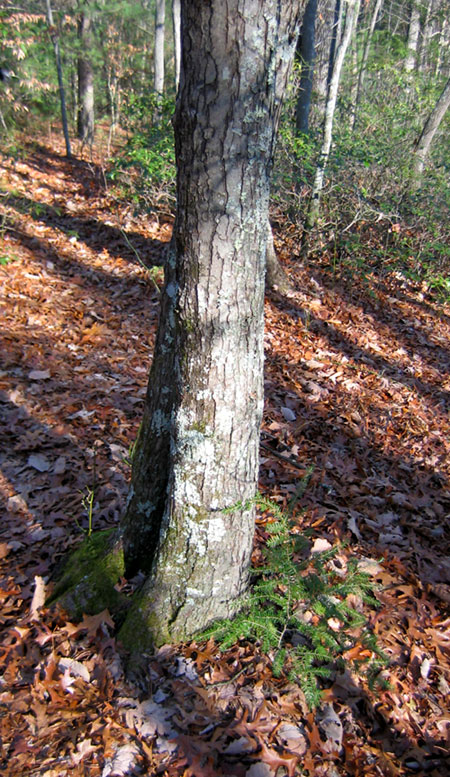
Winter in the Red River Gorge (KY)
(*photo
credit)
January
9, 2010 Consider
the Shared Commons
They hang the man and flog the woman
that steal the goose from off the Common,,
But let the greater villain loose
that steals the common from the goose.
(English poem about 1764)
As part of one human family on this Earth we share much in common,
and this includes the resources needed as essentials for higher
quality human life. This fact of sharing is often overlooked.
Some individuals or cultures regard themselves as privileged and
entitled to use more of the world resources than others. But
how are they so entitled and under what guise will they tolerate my
countercultural question? These people claim for themselves
resources that simply belong to all and, if there is entitlement,
the resources belong to those in most need -- not those with the
power to hold on tenaciously to ill-gotten goods. "Commons"
means basic entitlement to what is required for the necessities of
life -- and anything left over could be seen as a luxury for others.
To say such an utterance is leftist is to forget it is simply human
and Christian.
Each month in 2010 we will reflect on one or other of the elements
we hold in common. For instance, as fellow inhabitants of our
Earth we have a right to healthy air. One critic asked where
such a notion of right to fresh air originated. I wondered
whether he was breathing or not. In fact, what was inferred by
the remark was that smokers have a "right to smoke" and industries
had the right to "use" ambient air. In that particular
discussion the age old conflict of rights arose. Attention
turned to priority of rights, and the right to life has highest
priority. Other rights include::
1.
Water Commons January (Baptism, gurgling creeks)
2.
Cultural Commons February (birthdays)
3.
Air Commons March (breeze, wind)
4.
Productive Land April (gardening, foliage)
5.
Wildlife, Wilderness and Forests May (flowers)
6.
Health & Safety June (outdoor activities)
7.
Outer Space July (solar energy, space)
8.
Maritime Commons August (vacation time, lakes)
9.
Intellectual Commons September (new school year)
10.
Silent Space October (getaways and enjoying scenery)
11.
Transportation November (travel time)
12.
Communications December (renewing greetings at year's end)
This preliminary listing and tentative schedule of treatment may be
subject to some readjustment, but the twelve areas of the commons
now found in the current draft of "Reclaim the Commons" on this
website will be treated during the year.
Prayer:
Lord, show us the
way to share with our brothers and sisters throughout the world, and
to do so with a good heart and with a deep sense of what is
essential.
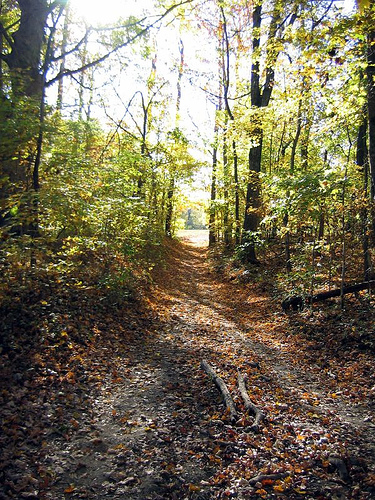
A view along the Natchez Trace, Tennessee.
(*photo
credit)
January
10, 2010
Cherish Our Baptism
I formed you and set you as a covenant of the people.
(Isaiah 42: 1‑7))
Christ was baptized by John the Baptist and is called to a ministry
in the spirit of Isaiah. Our own baptism was life's most
important moment apart from our physical birth. We were
spiritually reborn and became a member within the Divine Family.
Isaiah speaks of the Servant of Yahweh, and that voice of so long before
has been applied to Jesus and his public manifestation or the
second epiphany. Jesus is committed to a life of bringing
about change in the people, upsetting an entrenched established
order, announcing justice for all the people, a light to the
nations, a liberation of captives. In a very real sense, this
is a call to revolution, for the old order is no longer valid; it
must be changed, and Jesus' baptism is the initiating event.
Peter in Acts 10:34‑38 comes to a realization about his own ministry as
a continuation of the ministry of Jesus, now being further
extended to all God‑fearing nations and peoples. The
ramifications of this obedience to the call are hardly known, yet we return
over and over to our original call, to the point of a beginning,
to the catalyst that sets us on our way. Peter recalls the
beginning of Jesus's call to ministry when the Spirit came down upon him in
the form of a dove and the voice came from the clouds giving a
divine stamp of approval. Here Peter speaks in the name of all of us
in saying that our mission is linked to that of the revolutionary
call of Christ to begin a process of liberation of the entire world.
Peter becomes aware that he is part of this liberating
process, and the people say "Amen" to this.
Jesus goes into the wilderness to be baptized by John, and thus the
wilderness is the place for radical change. John, the radical in
lifestyle and in proclaimed message, is the forerunner, the one who
prepares the way. Jesus forms an association with this radical
and is radicalized in so doing; his act of being baptized
shows a solidarity with the people seeking to change their
individual lives. Jesus does more; he initiates a
radical change in the entire world order, and symbolizes this
through the baptism event. On our part we are radically
changed through baptism into a new creature, a member of God's
family. And furthermore we are formed into a new people who
carry on the making of God's kingdom as part of the Body of Christ.
When Jesus is baptized and the heavens open up, the Holy Spirit
descends upon him and the divine Godhead speaks a public
affirmation. We enter the spiritual wilderness, needing
to divorce ourselves from the connections with the world around us;
we open ourselves to follow the Spirit to perform deeds that will be
countercultural in scope.
Prayer: Lord
let us see the power of the grace of our Baptism/Confirmation and
act accordingly to bring about change in our troubled world.

Lycoperdon pyriforme, fungus on logs
(*photo
credit)
January
11, 2010 Reread "The Economic Bill of Rights"
Sixty-six years ago, during the height of war, President Franklin D.
Roosevelt delivered his State of the Union message; he sought an
expanded Bill of Rights. Here are excerpts of that talk:
This Republic had its beginning, and grew to its present strength,
under the protection of certain inalienable political rights --
among them the right of free speech, free press, free worship, trial
by jury, freedom from unreasonable searches and seizures. They
were our rights to life and liberty. As our nation has
grown in size and stature, however -- as our industrial economy has
expanded -- these political rights proved inadequate to assure
us equality in the pursuit of happiness.
We have come to a clear realization of the fact that true individual
freedom cannot exist without economic security and independence.
"Necessitous men are not free men." People who are hungry and
out of a job are the stuff of which dictatorships are made. In
our day these economic truths have become accepted as self-evident.
We have accepted, so to speak, a second Bill of Rights under which a
new basis of security and prosperity can be established for all --
regardless of station, race, or creed. Among these are:
* The right to a useful and remunerative job in the industries or
shops or farms or mines of the nation;
* The right to earn enough to provide adequate food and clothing and
recreation;
* The right of every farmer to raise and sell his products at a
return which will give him and his family a decent living;
* The right of every businessman, large or small, to trade in an
atmosphere of freedom from unfair competition and domination by
monopolies at home or abroad;
* The right of every family to a decent home;
* The right to adequate medical care and the opportunity to achieve
and enjoy good health;
* The right to adequate protection from the economic fears of old
age, sickness, accident, and unemployment;
* The right to a good education.
All these rights spell security. And after this war is won we
must move forward, in the implementation of these rights, to new
goals of human happiness and well-being.
Prayer: Lord,
give us the grace and energy needed to secure these rights, not only
for our people, but for all peoples.

Backyard finding: Unidentified mushrooms
(*photo
credit)
January
12, 2010 Bear Arms, Not Ammo
On
Plough Monday, there is nothing so patriotic as the image of a
patriot leaving his plough to defend his country against invaders.
Thus we conceive of the constitutional right to bear individual arms
-- that others in many countries find puzzling. Many Americans
regard this as an individual right -- and responsibility.
Others look at the arsenal as the community arms bearing locus and
believe that individuals will advance to that location when security
is threatened. Of course, times have changed since the
Constitution was written. Collectively we need security, for
many individuals such as tots and the elderly cannot bear arms.
Nor do we want the crazies to bear arms though many have access to
them.
As a strict-constitution person, I hold that each of us has a right
to own a musket -- we just do not have an individual right to the
powder, since this should be in the regional armory -- along with
the musket ball that can hurt someone. The massive shooting at
Fort Hood two months ago made us ponder; how could this partly
disturbed person get so much ammo to shoot over one hundred rounds
in a matter of minutes? Access to arms is a well-known fact,
and we have millions in the American Rifle Association who will
remind us of our defensive needs as individual people, many of whom
do hurt others. Then there are those who regard having arms in
the home as a Linus security blanket, without considering that these
weapons are more often misused than used properly.
When I was a kid on the farm we blew post holes in our rocky soil by
the use of a third of a stick of dynamite per hole. Obviously,
during fencing time we could lack necessary materials. Once my
father called ahead and got a supply of dynamite and asked me to
pick it up during the school lunch break but not to broadcast the
errand around too much. I stuck the purchase in my desk drawer
until the bus took me home -- and never thought a thing about it.
What would be the reaction today? Buyer, seller and bearer
would all be in court. The school -- if not the town -- would
be in lock- down mode. If folks get upset when a mercury
thermometer is broken, what would a half dozen sticks of dynamite do
to a rather overstressed school administrator today? My own
childlike response would have been, "Well I didn't place caps in the
sticks to set off a charge; we don't pound 'Nitrostat' chest
pain pills." I knew then and now that dynamite is not very
dangerous, if not struck on an anvil with a hammer.
Yes, the borne gun is not dangerous; it is the loaded gun. If
each hunter were allowed one shot or two at most, and no automatic
clips were sold, the world would be better off. The government ought
to have the right to search the premises of all armed people and
leave their guns but confiscate their ammo. What about the
dynamite bearers? Maybe my youth was a little too carefree.
Prayer: Lord, teach us to serve others; help us to make
the world a safer place where all can live in peace and harmony.
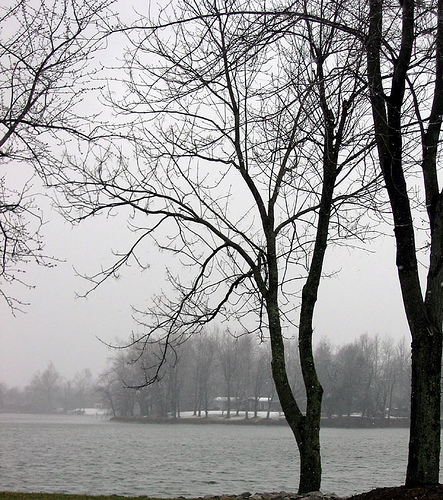
A snowy day, looking across Reservoir #3, Lexington, Kentucky
(*photo
credit)
January
13, 2010 Promote an Essential Needs
Economy
You need a new model of economic development -- one that is based on
raising people's standards of living by maintaining their natural
capital, not just by converting that natural capital to ranching, or
industrial farming or logging.
Jose Maria Silva
A consumption-based material economy is inherently limited because
the resource that constitutes the base is of a limited nature.
These materials require other resources to extract, process,
transport, use and dispose of them -- and without proper safeguards
this unsustainable practice can ruin the planet's environment.
In its basic form materialism is ecologically suicidal! Thus
those who profit from such a material economy take from a limited
pie to which others do not have equal access, and prevent the
meeting of the needs of those without access. This is why a
capitalism based on such a system is inherently unchristian and
ultimately inhumane -- and another system must be developed, one
where services are primary, not the goods that strive and fail to
fulfill human disoriented "wants."
Elements of such an "essential needs" economy include:
* Meeting basic human needs of all people, namely, potable water,
small farm production of essential food needs, adequate housing for
all, basic food in times of natural or human-caused disaster, and
primary educational and health facilities for all;
* Creating jobs for all people to move the world to a better quality
of life with competition not based on material profit motivation but
on higher-quality motivation that has spiritual and intellectual
profits as a goal;
* Halting the disturbance of the natural environment,
especially ceasing to deforest the planet;
* Replacing non-renewable energy resources with renewable wind,
solar and geothermal -- and limited use of certain biofuels;
* Limiting the amount of resources that can be controlled or
expended by individuals -- something that some regard as limits to
freedom but is really the expanding of freedom to greater numbers.
Such limits could be affected by removal of tax havens, by taxes on
excessive wealth and by confiscation of large-scale property
holdings with redistribution to those in need;
* Promoting educational opportunities, so that the full potential of
each individual can be realized. A growth of intellectual
capital is the goal, so that all may have the power to communicate
and enjoy the greater fruits of culture and life itself; and
* Providing access to communications facilities to all, with freedom
to exchange ideas and to express thoughts freely.
Prayer: Lord, help
us to convert ourselves from a material consumption-based economy to
one that is more oriented to the spiritual and intellectual capital
of our people, so that all may profit together while holding
material consumption to a minimum.
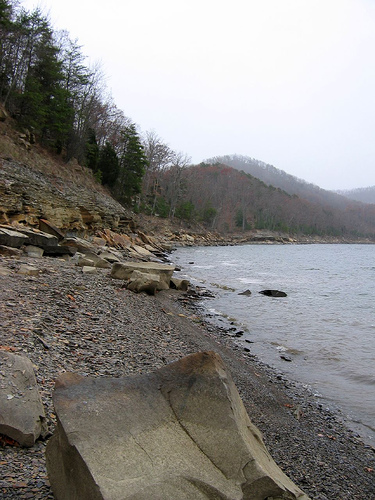
Cave Run Lake, near Morehead, KY
(*photo
credit)
January
14, 2010 Provide Health Care for All -- AND Ration?
On the great African medical missionary, Albert Schweitzer's,
birthday, it is fitting to consider the unmentionable -- health
care rationing -- something like talking about underwear styles or
defecation conditions. Well let us be frank -- we already have
rationing of health care. The privileged can get the best
care, best doctors, best facilities. The poor get less care,
and the uninsured can barely do more than go through the emergency
doors. Perhaps this will change with the coming health reform,
but not totally. We need to discuss health care in moral terms
as something for ALL the people, not what the privileged few might
expect. We must broaden the field and confront the reality of
rationing as part of the total health facility rights of people.
Broaden the field
means expand the concept of health care to all our brothers and
sisters throughout the world. Unrealistic? Hardly so, if
what we are talking about is the minimal care that would allow
people to avoid preventable diseases such as malaria and many
tropical diseases. To expect to give all people from all lands
the privileges of the Mayo Clinic or the best health facilities now
present in this country is unrealistic. To provide fifty
dollars for immunization and preventable malaria netting and other
basics globally would take only one-sixth of the world's military
budget, and that transfer of resources could be achievable through
global cooperation, total security concerns and will power -- and
far better ultimate security than any shield of sophisticated
weaponry.
Rationing of health
on a global level may have to be accepted, not to exclude some but
rather to include all. We hope all nations will not be able to
provide basic health care, remembering that a number of these
unfortunate lands, including Haiti and some African nations, have
more personnel working in North American and European health
facilities than in their own impoverished health facilities.
Rationing may mean returning these people (with some subsidies) to
their native lands and seeing that minimal health care is provided
to all. Of course, with time the concept of "minimum" may rise
and expand but to accept rationing in order to redistribute is
better than to pretend rationing does not exist in its present form.
Health care like fiction is fraught with flights of fantasy.
Health care for all may be a dream away, even after we are gone, but
it is needed if we are to answer before God for all our privileges.
Some will say such dreams are too expensive, but how do you value an
infant's death through a preventable disease? Let us face it:
all have the right to health care, but we must accept that there are
limited health care facilities here and now. Making these more
and more available is a realistic dream; converting resources
now used for disposable consumer products to health services is
realistic -- even though it will take time. We have to start
thinking about these things before this world passes on.
Prayer:
Lord, teach us to be realistic and universal.
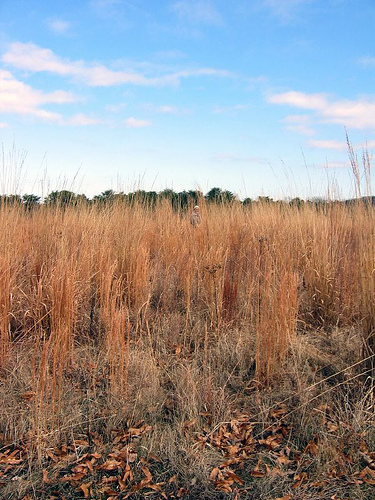
Prairie tall grasses in winter
(*photo
credit)
January
15, 2010 Fight Hunger Here and Now
Opulence and waste are unacceptable, especially when hunger -- the
cruelest form of poverty -- continues to rise..
(Benedict XVI's address to the United Nations World Summit on Food
Security in Rome on Nov. 16, 2009)
Food security means access to sufficient quantities of food to
alleviate hunger in all parts of the globe. Many people do not
have access to food markets and adequate supplies. We
ought to become aware of facts about hunger and ways of combating
it.
Basic facts include:
* According to UN Secretary General Ban Ki-moon over one
billion people are hungry today, and six million children die each
year of hunger, 17,000 per day, and one every five seconds.
* In the United States about one-seventh of the population has
had to curtail eating habits due to lack of funds or access to food
supplies.
* American food pantries and distribution centers have seen the
volume of people seeking assistance double during the 2008-9
financial crisis.
* Food prices rose in the last few years due in part to the
competition for limited grain supplies, and especially because of
corn (and sugar) production for biofuels.
* Food shortages do occur in parts of the world, but the total
global supply of food is adequate for feeding the world's people.
Ways of alleviating hunger
include:
* Support the UN "Billion for a Billion" campaign aimed at fighting
hunger;
* Assist groups that are helping with local small farm assistance
and development, for the most secure source of food is the local
community. The UN is assisting with land, seed, fertilizers,
access to markets and fair trade;
* Call on our government to assist with road and regional
transportation system development, making more locally grown foods
accessible to nearby urban populations;
* Influence youngsters to give direct donations to food aid for
natural disaster victims by use of "Rice Bowl" and other programs,
especially those featured as Lenten exercises starting next month;
* Support Oxfam America <www.oxfamamerica.org/give>
* Reduce food wastes at all levels from lunch rooms to home
kitchens; and
* Eat less meat. Promote better utilization of foods at
all levels. Direct consumption of grain is far more efficient
than converting grain to animal meat, milk and eggs.
Prayer: Teach us
Lord to see that enough food is present, and that our efforts ought
to be devoted to fair and just food distribution.
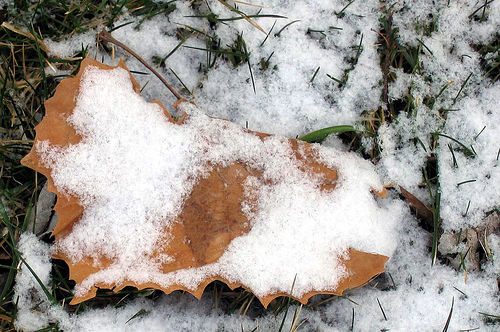
A dried American Sycamore, Platanus occidentalis, leaf,
covered with snow
(*photo
credit)
January
16, 2010 Eucharist: Memorial, Cosmic Mystery and Food
On
Religious Freedom Day we Christians consider the bonds of love
drawing us together as one Body of Christ in an ever deepening
Mystery of our shared Faith. We recall the saving deeds
of Christ, remember the pledge of future glory, and become nourished
with food to sustain us in the troubled present moment.
Memorial from
the past: "Do this in remembrance of me." The
Liturgy extends the passion, death and resurrection of the Lord in
space and time. The "Breaking of the Bread" (Acts 2:42; Luke
24:21) is a recall, a remembrance, a transcending event and presence
of what occurred two thousand years ago and is now in current space
and time; "there and then" becomes HERE and NOW. The
Holy Land is now extended to the entire Earth; Calvary is today.
We are no longer mere spectators of an historic event; we are
participants in a cooperative endeavor as members of the Body of
Christ. Christ gives himself to the Father and then to all of
us. From that historic past through the apostolic succession
involving the laying on of hands, the ordained priest consecrates
bread and wine into the Body and Blood of the Lord.
Cosmic Mystery of future glory: Teilhard de Chardin
had a vision of Christ's body in the entire universe as he
celebrated Mass at the altar of Earth. John Paul II speaks of
a Cosmic Act that unites Heaven and Earth "permeating all creation."
Something is coming to be for those with eyes of faith; the
Kingdom comes and a future promise is occurring in our present
world. The mystery that is unfolding before our eyes gives us
the thrust to carry on, to believe in a meaningful future and to act
as catalysts to accelerate that future, to "look forward to the day
of God and speed its coming." (II Peter 3:12)
Nourishment is
needed to bond us within divine love, and thus the sacrifice in
which we participate is also a meal. The saving task before us
as People of God is so utterly important that we are unable to act
without a food that is "Godself," nothing less. A mere
symbolic food would simply be a recall of past events; a
future hopeful horizon is not enough to sustain us in the present.
Nothing will suffice except food, the bond of Charity, the Lord's
Body. In this paschal banquet we are empowered with the risen
Lord, renewed with a promise of ultimate glory, and energized by
actual food that is Christ's person, a gift par excellence, the
Sacrament of Sacraments. "If you do not eat the flesh of the
Son of Man and drink his blood, you will not have life in you."
(John 6:53) Just as St. Athanasius reasoned that only a
Christ, who is God, could redeem and save, so as participants in the
saving act of Christ, only those nourished by divine food can so
act. Our Christian life must be a meeting of sacrifice and
promise made present in Christ. We do not act alone, but join
in a community of faith, thanking God for engaging us in the work of
the people.
Prayer: Lord
teach us to come and share together in your divine work and carry
your presence to the world.
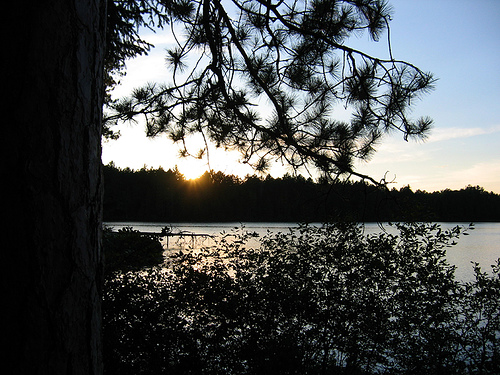
View from a water's edge
(*photo
credit)
January
17, 2010 Haiti and the Bonus-Takers
They
have no wine -- nor any potable water, nor food.
Ironically, this week we heard about the Haitian earthquake; we also
heard our president agonizing over what to do with a bunch of hot
shots ready to take fifty billion dollars this year in bonuses for
plunging the world in its current financial mess. On the one hand,
the Haitian catastrophe is called an "Act of God;" on the other
hand, bonus-taking is an act of a permissive generation of affluent
"nobles" with hands in making laws for the greedy. An Act of God
is a legal term that means "a disaster that is due entirely to the
forces of nature and that could not have possibly been prevented."
In secular terms, this act does not refer to divine intervention; in
an extended sense, much of the Haitian tragedy in human life and
injury could have been avoided by better building codes and
construction -- and thus was preventable.
In God's
way of permitting things maybe the Haitian people are to be the
leaders and teachers of the rest of us, and that is their invitation
to go to Calvary. Are they to make us come to our senses, and
refuse to consider greed as virtuous and suffering as the result of
sufferers' vices? Should we as democratic people propose
legislation to declare that bonus-takers, who have squandered the
wealth of the commons, do public service for their financial
misdeeds? Should they be sent to Haiti to bury the dead or
distribute food to the living? Could they serve as assistants to
building solar cookers; incidentally, these renewable energy devices
in the hands of every Haitian family could halt the use of charcoal,
which requires Haiti's few remaining trees. Probably most
bonus-takers would stand in the way of meaningful work; they are
hardly bright enough to lead. However, Haitians may be tolerant
enough to allow them to serve the poor.
One
recent Haitian story tells of the sub-culture of street children,
who gather in a base community each evening and pool resources;
they divide the fruit of their daily earning and begging equally
among all the members of the base group. From these very poor youth
in a very poor nation comes a powerful lesson to bonus-takers -- and
to all of us, rich and poor alike. Is the earthquake another type
of Act of God? Wake up! Redistribute wealth to those in need! Be
realistic! If "bright" people have used wealth badly, get them to
make restitution, not in prison, for they would not do the jail
duties well. Do public service. Take the bonuses in taxes and make
the original takers fill the jars of the world with the equivalent
of life-giving water, in order for us as a family of the planet's
people to celebrate together. Mary's simple observation, "they have
no wine" is where we launch into a global set of wonderful
interaction of giving and receiving. All of us working together
help make world grow in mutual trust among all of God's children.
Now that IS an Act of God.
Prayer: Father, help us to understand how You touch our world for the better.
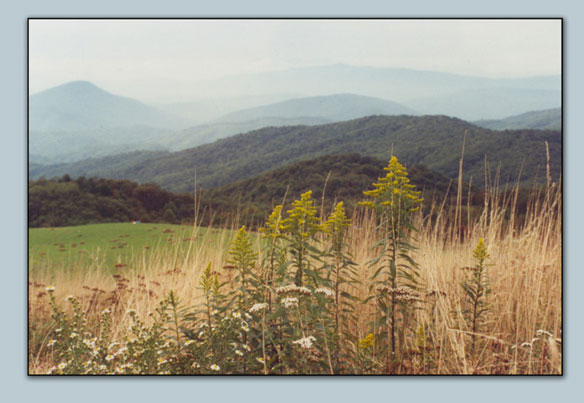
Photo by Warren Brunner for upcoming
release with Reflections by Al Fritsch, SJ
Click here for details!
January
18, 2010 Pray for Unity: Circles
within Circles
May they all be one. Father, may they be one in us, as you are in me
and I am in you, so that the world may believe that it was you who
sent me. (John
17:21)
Every January a majority of active Christians pray on eight
successive days leading up to the feast of St. Paul for unity among
Christians. This vocation to seek unity (ecumenism) is focused
on the commitment to Christ by the over two billion in the world who
call themselves Christian -- but in a broader sense this extends to
all faith-oriented people throughout the world (interfaith
cooperation). The entire family of human beings and all
creatures need to be drawn to ever wider circles of unity.
The thrust for unity among Christians is based on the firm belief
that we all share one baptism and faith in one Lord of all. As
Christians we share many other beliefs; within a particular
religious group there are ever wider circles of communities in
regions, nations, continents and the world. And to this is
overlayered the circles of fellow Christians who are not of one
fold, but still recognize belief in one Lord and God. This
broader circle embraces approximately one-third of the human race.
One image is that of a head of cabbage with inner cores and with
overlapping looser leaves. Such material representations
suffer from their physical limitations just as much as does a
three-leaf clover (the Trinity) that St. Patrick used as a teaching
tool for the Celts.
We work in our inner core circles on mutual sharing and support in
what we strive to do together -- and this takes an intimate unity of
connection and well-being at a very personal level, a sacred
communion of believing people. As we move out from this we
find that our unity is based on love and mutual interests that hold
local communities together. Tighter and more sharing
communities are able to extend their bonding to wider communities as
through a ripple effect. As we love more, we grow from inner
circles outward and embrace ever-widening areas.
Conflict and friction can frustrate our unifying efforts.
Hatred tears the head apart with leaves flaking off and dying.
This has happened in the past, and so we are all familiar with
disunity, whether at a local level or by a 9-11 type event on a
global level. Our unity prayer is for the love that the Father
and Son experience. Jesus calls us to this vocation to become
one so that this unity can be the sign of what we profess, namely
the unity of the God who loves us. Building the circles of
unity may be frustrating at times, but we are vowed to continue the
process, knowing that this unity is possible.
Prayer: Lord, give us the courage to be one, to work
together in love, to seek support of all, to build a better world
that cares for everyone, and to work together to heal our wounded
Earth.

A home-made suet cake provides a tasty
winter meal
(*photo
by Sally Ramsdell)
January
19, 2010 Give Thanks for January's Blessings
In the middle of winter many say the hardest challenge is to find
special things to be thankful for, for self-pity can become
all-prevailing. However, gratitude must again surface when
temperatures fall and ice covers the walkways of life. Finding
the things to be grateful for differs with individuals, but my own
individual suggestions may trigger your own listing of gifts to be
grateful for in January -- and with a little reflection there are
always many to consider:
*
Inclement weather, which makes us appreciate the gift of
physical mobility when we can use it by getting outside more often;
* The bare geological forms around, accentuated by
lack of foliage or by the covering of snow or ice;
* A
star-filled night in coldest winter, which has an inviting
atmosphere that summer and other seasons do not give, for we are
drawn to look heavenward;
* The
silence of a countryside while snow is falling;
* The
newly snow-covered landscape when the sun finally breaks
through, with an entire countryside filled with sparkling icy
diamonds, rubies, sapphires and emeralds of every imaginable design
and pattern;
* The
sounds of flowing water in creeks and streams;
* The
freshness of a landscape covered with new fallen snow and the
surrounding atmosphere;
* A
hot meal, which means so much more on cold days than at other
seasons, and thus we need to savor the tastes that can be brought
out with creative recipes and cooking technique;
* A
hoot owl's call making winter sounds so much more emphatic and
focused than when the world is alive with nature's varied sounds;
*
Holly bushes with green leaves and bright red berries;
* The
long darkness that makes sleep all the more restful, with all
the dreams that seem ever so much more pronounced in the winter
nights; and
* The
cardinal and bluejay that happened to remain through the
winter months.
Prayer: Lord,
teach us to respect all creation, even in the more silent times of
the year, and to show this respect through thankful thoughts, words
and an occasional smile.

A fresh-flowing stream near Franklin, TN
(*photo
credit)
January
20, 2010
Defend Our Water Commons
As mentioned earlier this month, we consider the commons from a
different aspect each month. We have celebrated Jesus' baptism
and realize that each of us is saved through water -- and thus we
are more spiritually inclined to save the water. Recently,
experiments of crashing a rocket into a crater near the southern
pole of the moon brought forth a cloud of dust and debris that
contained water, "moon water." It was like discovering gold,
for now exploring this otherwise lifeless heavenly body is at least
a little less complicated with water present, for life processes
require water in many ways.
Creeks, rivers and other forms of moving water manifest the flow of
life itself. In crisp winter weather the sounds of flowing
water seem to accentuate themselves. A gurgling stream or
rushing river, even in mid-winter's rest, is the sign that new life
is coming forth, although in some landscapes it is yet
imperceptible. This commons of useable and potable water is a
limited resource, which is all the more scarce because of expanding
population and higher resource consumption demands. In some
parts of the planet free drinking water at village fountains is
giving way to expensive bottled water that is obtained from soft
drink-dispensing machines. Running water in natural streams
was always regarded as a common property, but this is challenged by
property rights groups. The shores or riparian rights have
been claimed as property by individuals; the water rights have been
allocated to large farms or corporations; more powerful forces have
tapped in and drained the water for their own uses, privatizing
water at a profit.
We have a right to water for life itself; we also have a
responsibility to refrain from returning "used" water in poor
condition to the environment. Horror stories about polluted
water abound: in the 1960s the Cuyahoga River near Cleveland caught
fire; India's sacred Ganges is becoming a sewer, downstream
from a host of untreated sewage sources; some of China's major
rivers are now laced with heavy pollutants; in Appalachia "straight
pipes" leading directly into the creeks dump sewage into waterways
in the hope that "dilution is the solution to pollution."
Rivers are drying up before they reach the ocean (e.g., the Indus,
the Colorado, the Yellow, and the Rio Grande). The Jordan is a
brackish streamlet before it reaches the Dead Sea. Livestock
in large numbers pollute flowing streams; fertilizers and
pesticides pollute running streams and aquifers. Motor boats
add petroleum products and emissions to the water bodies in which
they operate.
The almost endless listing of ways in which water is contaminated
makes us all the more aware that aggressive ways must be devised to
ensure good drinking water for all and a plentiful supply of this
precious resource for irrigation and commerce.
Prayer: Lord,
teach us to use our more precious resources wisely and to ensure
that potable water is accessible to all.
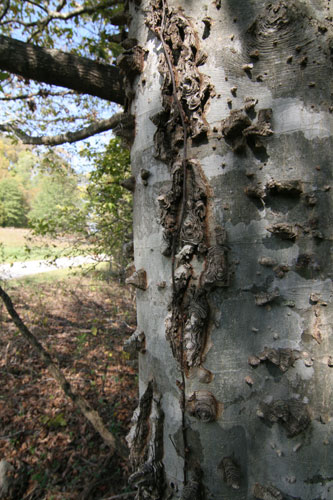
Sugarberry tree, Celtis laevigata
(*photo
credit)
January
21, 2010
Hug a Tree?
On
National Hug Day some have asked, did you ever hug a tree?
"Come on, be honest about it," they will say. My response
requires qualification even before the answer. I do hug trees
as part of practical -- and not emotional -- purposes. Yes I
have hugged people to show affection -- and the same for certain
animals that do not bite. Please understand why I occasionally
hug a tree.
The entire length of my arm span (each arm stretched out to the full
extent is six feet within a half inch; from each of my middle
finger tips to the elbow is almost one foot and a half or eighteen
inches; each outstretched hand from middle finger tip to wrist
is eight inches and each little finger to its first joint is one
inch, and to its major knuckle joint is two inches. Now, the
foot length, the "step," the "pace" and the stride" will
really bore you. All in all, without the use of our own body's
measuring instruments, many of us compulsive counters would be
terribly frustrated on a number of occasions when lacking mechanical
tools.
Back to
National Hug Day. I have been able to measure the girth
of a tree to within an inch of accuracy by the initial hugs and tugs
that it takes to move from point to point. Believe
it or not, I measured one tree in central New York near Albany that
took three six-foot "hug spans," plus more measurement of body parts
as well to determine the massive circumference (almost twenty feet)
-- and now I forgot what kind of tree it was. The mode of
measurement is a sure thing; retention by an aging mind of what gets
measured is more problematic. However, the fact that I
measured the tree is a sign of respect and love in its own way --
and we established its girth.
Some notes of caution. Measurements come in many proximate
ways, and thus "hands" (for measuring horses) is one of the
multitude of old English measuring systems, all based on some common
sense general measurement. Remember your own body part will
differ from mine, so I suggest that you develop your own system with
the aid of a ruler or yard stick. You may want to go
international and put your length measurements in meters, and that
is all the better. Or you may want to always carry around a
measuring tape and that is commendable.
Back to hugging. Many people and animals certainly deserve an
occasional embrace. We seem to forget that an occasional hug
may be all that it takes to get through the troubles of our world,
so think of others and their needs. I am unsure of the plants
of this world, for they are far less sensate. However, these
plants know to some degree whether we appreciate them, but our
appreciation need not be so expressive as a hug. It is hard to
hug a clover or a blade of grass.
Prayer: Lord I
think You hug this universe with your broad embrace. Teach us
to love in the best way we can and to show it, especially when
others are in need.

Winter morning
(*photo
credit)
January
22, 2010
Anticipate the Climate Toll
In a recent British Broadcasting Company interview a renewable
energy researcher stated in despair that the Earth is already on an
irreversible route to destruction and there is no remedy possible.
He said we should have acted sooner. His pessimistic
conclusion is itself part of the "climate toll." Publicly
saying that it is too late, especially among articulate and sincere
people, creates an atmosphere of disbelief and negativity.
Such lack of faith in the future can result in a variety of
escapists launching into all sorts of perverse behavior. That
is at a time when their own energies are so utterly needed in saving
our troubled Earth.
Some of the most recent United Nations' reports state that the
Greenland ice sheet is melting far faster than had been predicted
even eight years ago. If the entire sheet were to melt in the
next several decades, the oceans would rise by nine meters or about
twenty eight feet. There would be a lot of flooded coastal
areas including several Pacific and Indian ocean nations.
Talking about global warming in the middle of winter tempts us to
say -- "bring it on." However, that is just a
temptation, an escapism in itself. The actual climate change
is a frightening possibility.
An article dealing with the European heat wave of 2003 in the
Swedish publication ";Acid News" (December, p. 9) said that
during the month of August, 2003, the heat wave killed 14,802 in
France, some 4,200 in Spain and Italy, 1,300 in Portugal, 1,400 in
the Netherlands and 2,050 in the UK. The article went on to
say that the summer of 2003 was the warmest ever recorded in the
northern hemisphere. And normally relatively cool Europe was
totally unprepared for it. Such an extreme wave did not repeat
itself, nor did the extreme of the hurricane season of Katrina.
However, extremes are not the telling point even when severe heat
waves and natural disasters continue year after year. The
problem is the pattern and the average rise in temperature of oceans
and land. This pattern is what concerns the researchers on
climate change, not the particular news of one or other disaster.
We know that climate change affects the most vulnerable parts of the
world and thus sufferings are in store for us this year though we do
not know where or how severe. The poorest people lack escape
routes, adequate food and shelter and other aspects of a higher
quality life. Natural disasters are costly but can hardly be
avoided. However, changes can be made to alleviate some of
them if we do not throw up our hands and say it is too late.
We can stop the deforestation, launch a renewable energy economy,
move the most vulnerable away from the flood zones, and conserve the
limited water supplies. The world needs our concerted efforts,
and people can change in time of crisis, but we must have faith in
the future.
Prayer: Lord, teach us concern about the least of our
brothers and sisters in this time of climate change. Help us
to combat sterile pessimism by a realistic path to sharing
resources.

Fox sparrow, Passerella iliaca
(*photo
by Sally Ramsdell)
January
23, 2010
Speak Up for Renewable Energy
On
National Pie Day we ought to consider reslicing the energy pie
so that we come more quickly to a sustainable energy economy.
The U.S. Energy Information Administration shows this slicing
is occurring at a rapid speed with a movement towards a renewable
energy economy. In the first two-thirds of 2009, renewable
energy sources -- hydropower, biomass, geothermal, solar and wind --
accounted for 10.45% of net U.S. electrical generation.
Hydropower accounted for almost two-thirds of the renewable energy
supply. During a comparable eight months of 2008, renewables
accounted for 9.42%. During this period total electrical
output dropped by 4.90% with the major source of the drop
attributable to coal that fell by 12.6% in that time span.
The fastest growing of the renewable energy sources is wind, which
increased by 60% for August 2009 over August 2008. Much of
this expansion is in higher quality wind areas, but due to rapidly
improving wind generating equipment, even areas of moderate wind
quality are showing substantial increases. Minnesota, a
moderately endowed wind state is now fourth among U.S. states in
wind generated electricity. This has made obsolete a
U.S. Renewable Energy Map we were generating here, because
differences in quality are diminishing due to better wind generating
equipment. Another factor that has been somewhat overlooked in the
past is the immense offshore wind potential on the eastern Atlantic
Coast. Some estimate that within three decades the Northeast
offshore wind farms could supply enough gigawatts of electricity to
the traditionally energy deficient Northeast to allow the region to
be self-sufficient if not an energy exporter.
In addition to the drive towards capturing wind, much recent effort
is being made in geothermal in California and much of the West, in
solar energy in the South and Southwest, and in the research into
biofuel alternatives such as switch grass and non-food cellulosic
plants and wood waste. Small-scale hydropower plants are
either being reopened or installed through federal economic stimulus
package money moving to various states at this time. The high
costs and dangers of nuclear power plants have made many electric
companies refocus attention on renewable energy sources. Solar
is far behind the surge for wind electric generation. In fact,
the global demand for solar cells dropped by one-sixth in 2009,
though remaining a strong 4.6 gigawatts. Sales are expected to
rebound this year with an up to ten percent increase over the slow
2009.
The renewable energy future is bright, even if climate change
legislation is only inching through Congress. Improved
transmission systems now being constructed will allow renewable
energy to be more easily transferred from sources to points of use.
Prayer: Lord,
You renew all things. Help us who seek to heal our wounded
Earth by promoting renewable energy, which is far less polluting and
more fulfilling in moving this world forward.

Barnyard grasses
(*photo
credit)
January
24, 2010 Initiate Twelve Types of
Liberation
He has sent me to proclaim liberty to captives. (Luke
4:18)
Today, we hear the Word and we pronounce it as Jesus did when
reciting the passage from Isaiah the prophet. We too are to
bring liberation into the world in which we live in several ways:
Peer pressure:
Many are bound by what others require and think and say. Thus
assisting others may require us to go counter to such strictures,
for many want us never to act except in the precise way they want us
to behave;
Demanding expectations:
Some chart our lives for us and when we do not conform they exert
pressure. We need to prepare them for what the Spirit moves us
to do and say;
Material wants:
In being like Christ we desire fewer material goods and thus greed
can be reduced;
False witnessing: We are often forced to say that each
must be an individual, but we are expected to accept how others act
even though we totally disagree;
Living extravagantly: We need to free ourselves from
the interior demands to dress like others, eat like others and do
the same things as others (lawns, types of vehicles, forms of
entertainment);
Unhealthy practices:
Stress, wrong foods, smoking, drugs, and other bad habits can be
avoided through the liberation resulting from self-abnegation and
radical sharing;
Busyness: By
valuing silence, less travel, physical exercise, prayer and
meditation we can make an abrupt change from the occupational stress
that can chain us down;
Meaningless suffering and sacrifice:
When we enter into Christ's life to the full we see that our
sacrifices are a participation in his and gain energy in this
cooperative venture;
Failure to speak:
Sometimes we must speak and this can be risky and costly -- and yet
it must be done for others' benefit;
Fantasy world:
Too many live a life of make-believe;
Feeling old or worthless:
Aging can become an opportunity to see that each thing we do has
infinite value; and
Failure to engage in the environment: Each of us must see
that we live in a troubled world, and that our actions affect all
other creatures to some degree.
Prayer: Lord, You
are liberator; make us liberated.

Passionflower, Passiflora incarnata
(*photo
credit)
January 25,
2010 Imitate the
Conversion of St. Paul
Paul was a
fanatic and saw persecution of Christians as the only approach to
holding onto his strongly held beliefs. If others did not follow,
they were to be beaten or killed. His conversion should be a sign
to the rest of us that such procedures do not work. Paul's
conversion occurred while traveling, namely by being struck from his
horse. He was changed from a persecuting world traveler to a
persecuted one. However, the new hardships that he willingly
undertook for Christ were endured while using many creative ways to
travel and communicate with others.
Paul's
ministry involved a transformation that worked well with the
technology of his day. The Roman road and letter system was worthy
of good use and Paul took advantage of it. Roman roads were
well-paved, relatively secure, included rest stops and lodgings, and
included well-guarded and constructed bridges and portals. Because
the system was excellent for travel and communication, Paul's
message was able to go out to all the world - a message of love and
non-violence, a message of urgency and conciseness.
Today we are to
leave our ways of violence (misuse of resources) behind, and to
bring a message of peace as well to all people. Our system of
communication is fast and relatively safe. In a matter of moments we
can reach listeners in distant lands at low effort and low cost --
far less effort and cost than even Paul had to his advantage. The
Internet is our new Roman Highway. This
Daily Reflection here is sent to almost
110 countries each month (with 845,000 monthly hits). Many times in
the past decades when constructing public interest reports, I
wondered how would that word could ever be sent so it could be
received by a world audience. My first bout with mainframe
computers at the University of Texas at Austin in the late 1960s and
early 70s pertained to chemical research; we never even imagined
personal communication over wider distances. Even during much of my
four-decade-old public interest career when personal computers came
into vogue, we never thought that a global Internet was possible.
Today,
we need to consider again the zeal and raw energy of Paul, and
attempt to repeat to a small degree the work that he performed while
inspired by the Holy Spirit. The age is right for spreading the Good
News, and the Spirit moves us. Many say the Internet is
distracting, a waste of time, according to some, and a temptation to
fill one's mind with the wrong things. But where sin abounds so
does grace, and so we must see this as a grace-filled moment in
which we can respond to God's call to follow in the footsteps of
Paul. Our conversion is to see the opportunity that is here and now
to spread the Good News. This is the acceptable time; this is the
moment of salvation.
Prayer: Lord, give us courage similar to
that of St. Paul; give us the foresight to see the opportunities
that are present; help us to respond to these with fullness of
heart.

An old hickory tree against a winter sky
(*photo
credit)
January 26,
2010 Comment on Enlightened
Self-Interest
Always consider the other person to be better than
yourself, so that nobody thinks of his own interests first, but
everybody thinks of other people's interests instead.
(Philippians 2:4)
My
essay of December 17, 2008 showed my disagreement over the concept
of "enlightened self-interest" as conceived in today's world. Some
challenged my view and noted that the concept was first used in 1835
by Alexis de Tocqueville in Democracy in
America. What Tocqueville apparently
mentioned is an enlightened regard for oneself as an agent to assist
others within the community or civic association. I cannot fault
such an understanding but regard that as part of the broad "public
interest." Thus the sacrifice of time and property for the sake of
the greater good, knowing full well that all including oneself will
benefit from such a sacrifice, is a public -- not a selfish --
deed. Tocqueville was really contrasting the American and the
French civic mentality of his day.
Rather, in a modern understanding, the "self" is contrasted to the
"public interest" and refers to the autonomous individual attempting
to make his or her self apart from others. This is the total
ego-oriented subject devoid of relationship or personhood with
respect to others ("all for me, and me for me"). In fact such an
egotist is separating the self from community and acts for his or
her interests alone; enlightenment is making an appearance of being
cooperative, but is primarily interested in self. However, when
some people speak of the "self," they may refer to family, small
community or even a region or nation, and this goes far beyond the
purview of the individual self. I would not object to this broader
self, for actually the person so acting in a local society is
conforming to the principle of subsidiarity, that is, acting at the
lowest level of organization in which satisfactory results can be
achieved. Enlightenment enters into communal activity -- but that
is hardly the "self," except when using the term loosely to mean
what is "proper," namely, my home, my town, my country, or my world
in which I identify myself.
We are
enlightened through insight, and so this is an invitation seldom
solicited. Send your comments on this subject to our website.
Regard the battle as between self-centered activity and the public
interest. We can observe selfless saints, fallen heroes and
sacrificing caregivers; their lives refute self-centeredness, even
when in many cases it was a painful learning process. By giving up
self we gain all, including the elevation to a noble selfless
state. With Jesus this takes a plunge of faith. While
self-interest in contrast to public interest leads to greed,
selfishness, social disruption, and loss of a sense of commons and
democratic process, public interest leads to total fulfillment
including the self.
Prayer: Lord, keep us public spirited;
help us to sacrifice for the good of all, and thus ultimately gain
self worth.

Cardamine douglassii, purple
cress
(*photo
credit)
January 27,
2010 Take Responsibility
If you don't
work, you don't eat. That is an invitation to take responsibility
-- and that is often lacking today in the world of many rights but
few duties. Some say openly that the lack of collective or
individual responsibility is destroying our planet -- and
ourselves. I note in various instances with the very young that
when they are asked whether they are sorry for their wrongdoing they
hesitate in bewilderment. They had never confronted personal
responsibility in their lives. But that does not hold just for the
young; most adults would say that wrongdoing is on the part of
others, and that they are never to blame.
Our
troubled Earth suffers from lack of taking responsibility, from
denying the problem, excusing ourselves and escaping to something
nicer. Failure to take responsibility is destroying ourselves and
our planet. Climate change is the result of the privileged class
feeling comfortable in consuming what belongs to all, both the
present and future generations. Simply buying off our wrongdoing
such as exotic travels, by "caps and trade" or carbon offsets is
shifting from personal responsibility to escapist techniques.
Some
expend energy for self-indulgence. Others who are at the service
of society may calculate their individual resource expenditures
(e.g., fuel used) against themselves. Coast Guard cutter operators
serve a regional, national or global defense system. Thus the
resources they use ought not to be attributed to them but divided
among the public served. That is precisely why individual
statistics on resource use are so imprecise and even verge on being
meaningless except for crass resource wasters. Both expenditures
and responsibilities become muddled.
Now
back to the question of taking responsibility. We prefer to do
superficial acts (recycling bottles) and to forget the big picture.
A democratic society is NOT one that allows individuals to do as
they please (and freely waste resources as they choose); a
democratic society must force change in behavior, especially when
the conduct of the wrongdoer highly affects others. We must take a
middle ground between voluntary individual responsibility that a few
do well and a totalitarian state that forces all to act in
lock-step. The middle position is to take positive steps to force
behavioral change from a collective standpoint and not allow wasters
to continuing destroying our Earth. Prophetic people such as
suicidal terrorists can be terribly wrong. What they are right
about is that individuals seeing the need for a collective suicidal
activity (wasteful consumer expenditures cause climate change) must
speak openly for meaningful change.
Prayer: Lord, teach us to take
responsibility, not only on an individual level as practicing
believers in the future, but as citizens who are witnesses to the
truth. This is risky, for violence can be raised against us as it
was for Jesus.

Wild turkey (Meleagris gallopavo) crossing
(*photo
credit)
January 28,
2010 Observe Road Safety Practices
Yes, I
sometimes drive too fast, and after dark, and allow myself to be
distracted, -- but I'm one of the last earthlings cell phone-free.
All things considered, all of us on the road -- drivers, riders,
bikers and walkers -- need to be careful, for one million
unfortunate people a year and three thousand of these this day will
die in 2010 from road accidents. In most countries of the world
such accidents are the number one cause of the 15-29 year age-group
death rate. Statisticians tell us that 90% of these deaths occur in
developing countries, meaning that safety has a long way to go when
more and more motor vehicles are added to already-crowded highways
and byways. Furthermore, it is expected that the road deaths
especially in these nations will double to two million by the end of
this decade.
Congestion is not the only cause of road accidents. People,
especially younger drivers, show off their skills and take risks;
some take alcohol and other drugs while attempting to drive; still
others speed, fail to maintain their vehicles and disobey existing
road rules; still non-drivers simply walk to and from work or market
or school on unsafe roads. Furthermore, the local and regional
governments are distracted by other problems and negligent with
respect to road and motor vehicle maintenance and regulations. When
the United Kingdom cracked down on driving practices the nation was
able to cut road accidents in half.
Oh my, let us get to the nitty-gritty! What needs to be done?
We travel too fast, too far without breaks, and we travel too close
to the car in front of us. We become tired and impatient and
drowsy. We all need to drive within the speed limit, observe signs, use proper signals,
know when we are too old or infirm to drive, avoid eating while driving, or
smoking or drinking, or using a cell phone, or texting messages, or
writing letters, or becoming distracted. Yes, we need to take
responsibility for the safety of the roads, for many depend on us for
their own safety. All of this may demand greater observance on the
part of troopers and cops.
Roads
are a blessing: a movement away from the curse of isolation; a
portal to the outside world; a gateway to distant places; a means to
marketing products and obtaining necessities; a path to vacation and
sightseeing; and a means of getting to work or school. Roads are
good, but the many little crosses sprouting along the side of them
remind us that roadways are places of death and injury, and turned
over vehicles, and flashing lights, and ambulance sirens, and ruined
dreams. The smooth highway to greatness can lead to an accident
with its dire consequences. It only takes a second and a crashing
sound -- and then all of life flashes before the mind. The picture
is unclear; it always is.
Prayer: Jesus, you are the way, the truth
and the life. Move us to see and use the way clearly, to be
truthful and honest with our limited abilities when on the way, and
to value our own and the lives of others so highly that we will
drive safely at all times.

Eastern bluebird (Sialia sialis) and morning doves (Zenaida macroura) at winter bird
bath
(*photo
credit)
January 29,
2010 Redefine the "Privilege" of
Offsetting
It's not that there are too many Chinese and Indians in the world;
it's just that too many of them want to be like us.
Anonymous barstool pundit
Some
folks prefer to continue in their luxurious ways. The privileged,
those born into a land of bigness (financially and militarily), are
able to inherit power and thus have access to those of influence.
Often in the mistaken name of democracy they retain their privileges
through absence of good regulations and fair taxes. In truth, the
"they" are really "we" with our literacy, spare time, computer base,
security, protective laws, and ability to freely communicate, which
are privileges. If we are privileged, let's take the
responsibility to share these with the underprivileged in the rest
of the world.
Carbon
offsetting is a guilt offering for the privilege of using some
resource. It may involve buying potential forestlands and then
proceeding to pay someone to plant saplings; these plantings will
take a hundred years to offset the fuel used (and carbon footprint)
for attending a conference of some sort. Passive attendees
certainly have little to justify such travel when the information
gained could have been learned by clicking on Internet sources --
though socializing has intangible benefits. However, the offset
trees can be damaged, die, be eaten by goats or struck by
opportunistic diseases that kill entire species or sub-species --
elms, pines, hemlocks, dogwoods and American chestnuts. Furthermore,
a future, highly down-sized culture may decide to cut the trees for
firewood. There's no guarantee the offset will pay off, only the
irresponsible hope that excess use of resource will be offset
through someone else's responsible action.
Yes,
we are privileged and let's be frank about it. However, part of our
privileged duty is to help make the world better. We need to be
Passover people, passing over privilege for the sake of the duty of
looking at a world of critical needs. In accepting the privileged
power to make change in meaningful ways, we give up self interests
for the greater whole. We move from unsustainable ways to more
sustainable means that provide good food, housing, health and
education for an entire global population. Thus we can redefine
offset as accepting the privilege to serve others in ways that allow
all to share a better world.
The
one who offsets in order to continue wasteful and unsustainable ways
of living is expending precious time and resources that should be
spent by an involved citizenry working to "force" change upon the
system. How much longer will it take to heal the planet due to such
callous offsetting? We need to work fast and move towards new
solutions, not give guilt offerings.
Prayer: Lord, don't stop us from planting
trees, only from planting trees so others can waste our limited
resources that ought to be used as part of essential services.

Icy winter
scene in Kentucky
(*photo
credit)
January 30,
2010 Can We Halt Climate Change?
A
solid spirituality must confront reality, no matter how adverse,
directly. Now that the hype, proposals, promises and basic
agreements related to the Copenhagen Conference have been discussed,
we wonder aloud whether we can succeed in the future.
Over
twelve years ago, the Kyoto Conference gave noble goals and
international agreements. However, in the intervening years between
the two conferences several facts emerged: from 1997 to 2008 carbon
dioxide emissions from burning fossil fuel
increased by 31%; average global
temperatures during that time span
increased by 0.4 degree; glacier melting
in Africa, Asia, Europe and South America
increased; average ocean levels
increased by one and a half
inches. Add to this the increase
of one new Chinese coal-burning power plant weekly and others as
well, along with a rapid increase
in the coal-burning practice (predicted to rise from 41% to 44% of
total global fuel sources by 2030).
An
awareness of global disaster has emerged in the 1997-2009 span.
Unfortunately, in a classic case of denial, in the immediate period
leading up to the Copenhagen Conference those Americans believing
that a climate crisis was occurring decreased from the 70+% level to
57% of the general population. This denial is even more ominous
than the depressing physical practices cited above, because without
an awareness of need to act, nothing will occur. Too often, people
deny troubles or try to excuse themselves or to escape when they are
so confronted. Spiritual insight to act corrodes with the
materialistic onslaught. There then develops the mutually assured
destruction we have talked about earlier.
The
answer for people with faith in the future is that the reality of
growing difficulties must be confronted and addressed forthrightly.
This means we are to humble ourselves to accept our service role in
changing the world around us. We cannot go alone, so we must join
with other people of faith into a single praying and working
community willing to get our hands dirty.
WE must know the
HERE and NOW.
The WE are people who are willing to work; the HERE is to be present
to the conditions; the NOW is to regard this as the acceptable time
to act.
The
only way we can reverse current trends is to move rapidly from a
consumption-based economy to an essential needs-based economy, where
the basic needs of all are being met with the resources now used for
a false global military-based security. This new alternative
economy places emphasis on spiritual, not material, profit; it
means that efforts are needed to counteract the allurement of
Western materialistic values on the emerging nations of Asia, Africa
and Latin America; it means that the vast divisions of wealth in
the world are to be eliminated and redistributed to those in
need.
Prayer: Lord, we pray that we might have the
light to see, to buck up our courage, and to act to address the
global crisis at hand.

Unidentified fungal growth found in
backyard grassy habitat
(*photo
credit)
January 31,
2010 Support Hometown Prophets
(Luke 4:21-30)
Hometown folks are not necessarily hostile; they simply know us --
or at least think they do -- all too well. In fact, my hometown is
a wonderful and beautiful place to which I enjoy returning when time
permits. However, Jesus leads us to discover there is a way of
looking at a "hometown prophet" through an honesty that many of us
shrink away from for a host of reasons: a hometowner's perceived
lack of credibility; known past indiscretions on the part of that
individual; a perception that the individual is no better than the
stay-at-homes or is still immature; a familiarity that breeds
contempt.
Why
did the talk by Jesus raise such ire in his hometowners? Remember,
he is really saying that the home place is not privileged, but that
salvation and concern reach out to all people of good will, not the
audience alone. What Jesus challenges is the special privilege of
the home place or culture or social status, and he challenges the
residents by showing that the home town qualities actually extend
out to a greater number of people. His examples are that Elijah,
the prophet, was sent to a widow in Zaraphath in the land of Sidon;
Elisha, the prophet, cleansed Naaman the Syrian. Salvation is for
all, and local loyalties are best served by sending some of the
town's sons and daughters out to other places. That message is
difficult for some (the prophets) to make and many (the residents)
to understand and accept.
Loyalty is best served when the local people support their own in
giving to a greater world that which they cherish so much. This may
be asking much, but there is more. Some are better able to give
what we cherish and to do so without referring to the home
town. Generosity is demanded on the part of all and that is often
wanting. The prophet sent is saying far more than the average
resident wants to give or share with others -- and this may result
in criticism -- or even violence shown to the one going forth.
Those who stay at home may resist the one going away and speaking.
"He doesn't speak for me," is one refrain. But in fact, he ought to
speak for the home place for it makes life easier for him -- and
what he gives he at least owes in part to his local community.
If we
do not support those sent, we will be opposing them at least
implicitly. Negativity hurts. Giving moral support allows the home
town to be part of the process. Just as in the athletic or
entertainment fields, the pride in a home town son or daughter is an
affirming gesture, so ought it be for prophets as well.
Certainly some folks
go off the deep end, and the hometowners must make the proper
distinctions. But there are many who do not have home support when
it is highly needed. Let universal love take effect here; extend
love to all, not just a few.
Prayer:
Lord, help us to see the good in those near and far, and do not
allow us to disparage others who strive to do good.
|